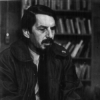Robert Creeley

Robert Creeley
Robert Creeleywas an American poet and author of more than sixty books. He is usually associated with the Black Mountain poets, though his verse aesthetic diverged from that school's. He was close with Charles Olson, Robert Duncan, Allen Ginsberg, John Wieners and Ed Dorn. He served as the Samuel P. Capen Professor of Poetry and the Humanities at State University of New York at Buffalo. In 1991, he joined colleagues Susan Howe, Charles Bernstein, Raymond Federman, Robert Bertholf, and Dennis...
NationalityAmerican
ProfessionPoet
Date of Birth21 May 1926
CountryUnited States of America
You were saying that once when visiting Yale, you were struck that unlike Pound, Williams's thinking was volatile, I mean, did not stay locked into a pattern of concepts that then defined his subsequent necessary behavior, whereas Pound did.
There are a lot of editorials that have nothing to do with anything like that. But I was just thinking of that sense of prose as being very responsible and perceptive, thoughtful, intimate, and contriving a quote statement.
I did however used to think, you know, in the woods walking, and as a kid playing the the woods, that there was a kind of immanence there - that woods, a places of that order, had a sense, a kind of presence, that you could feel; that there was something peculiarly, physically present, a feeling of place almost conscious ... like God. It evoked that.
I don’t think any man writing can worry about what the act of writing costs him, even though at times he is very aware of it.
As I get older, I recognize that my thinking about poetry may or may not have anything actively to do with my actual work as a poet. This strikes me as no thing cynically awry but rather seems again instance of that hapless or possibly happy fact, we do not as humans seem necessarily aware of what we are physically or psychically doing at all!
Again like Williams, with the emphasis now regrettable, when a man makes a poem, makes it mind you, he takes the words as he finds them lying interrelated about him.
The irony of our social group is that so often everyone feels this, but there's no company whatsoever in that feeling. Think of Pound's great emphasis, the way out is via the door.
Don't name it, as they say, because instantly you offer it to this peculiar authority.
And what's fascinating in The Ten Thousand Things is that although there's time, an inexorable time of the three generations of lives, actively present, but place is the time, time doesn't really have to do with simply the human experience of it.
First you wonder if they're separate stories, but no, they're not, they're contingent stories and they form a pattern. And you begin with some of the island as the place to which the heroine of the book returns.
That poetry survived in its formal agencies finally, and that prose survived to get something said.
At least I felt a responsibility for everything that was started. It must have been that New England sense that you've got to finish what you start.
All of which was OK, as that proved then, I certainly wouldn't contradict it as a necessary sense of things.
It's as though all the terms of a family were present at one time rather than his dad and his mum. Not just a present authority, but the resident memory of what qualifies what else is the case.